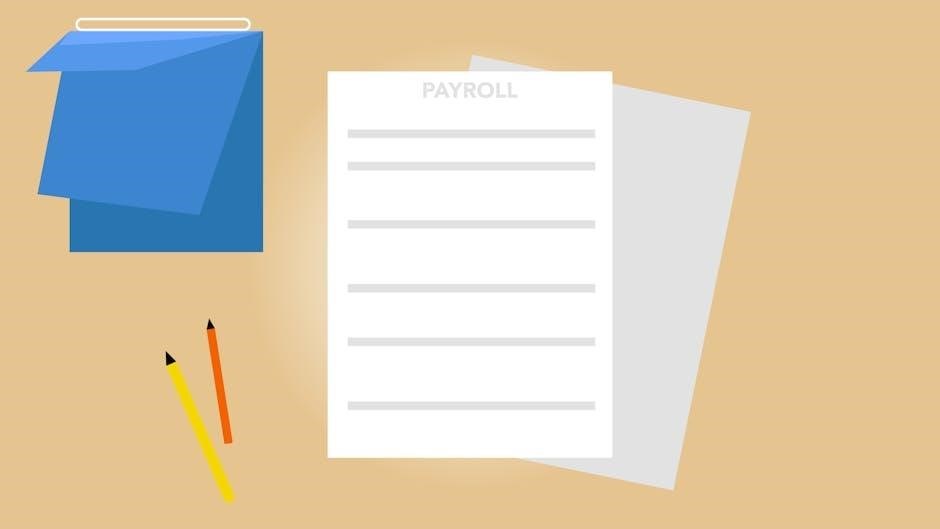An employer template for a jury duty excuse letter is essential for formally requesting an employee’s release from jury service, ensuring compliance with legal obligations and minimizing workplace disruption;
1.1. Understanding the Purpose of a Jury Duty Excuse Letter
A jury duty excuse letter from an employer is a formal document requesting an employee’s release from jury service due to workplace impacts. It provides details about the employee’s role, the potential disruption to business operations, and explains why their absence would cause undue hardship. The letter must be professional, concise, and include specific reasons for the request, ensuring compliance with legal requirements while addressing the court’s needs for valid exemptions. Its purpose is to effectively communicate the employer’s stance and justify the employee’s excusal.
1.2. Importance of Using an Employer Template
Using an employer template for a jury duty excuse letter ensures professionalism and legal compliance. It provides a structured format, guiding employers to include essential details like employee role, business impact, and specific reasons for excusal. Templates help avoid common mistakes, ensuring clarity and conciseness. They also save time, allowing employers to focus on key points while maintaining a respectful tone. A well-crafted template increases the likelihood of a successful request, protecting both employer and employee interests during the jury duty process.

What is Jury Duty?
Jury duty is a civic responsibility where citizens are summoned to serve as impartial jurors in court proceedings, ensuring justice is upheld through fair trial processes.
2.1. Definition and Overview
Jury duty involves citizens serving as impartial jurors in court proceedings, playing a crucial role in the administration of justice. It requires individuals to attend trials, listen to evidence, and deliver verdicts based on the law. This civic responsibility ensures that legal decisions are made by representatives of the community. Employers must understand jury duty’s impact on their operations, as it may necessitate temporary workforce adjustments. The legal system relies on jury service to maintain fair and just outcomes in both criminal and civil cases.
2.2. Types of Jury Trials
Jury trials can be categorized into different types based on their purpose and scope. Civil trials involve disputes between individuals or organizations, often seeking monetary damages. Criminal trials determine the guilt or innocence of a defendant in relation to a crime. Additionally, grand juries decide whether enough evidence exists to bring charges against a suspect. Each type of trial requires a jury to fulfill its civic duty, ensuring justice is served fairly. Employers should understand these distinctions as they may impact the duration of an employee’s jury service, particularly in federal cases, which can be lengthy.
2.3. Legal Obligations for Employers and Employees
Employers are legally required to allow employees time off for jury duty, with laws prohibiting retaliation or penalty for serving. Employees, in turn, must respond to summons and fulfill their civic duty unless legally excused. Employers must provide unpaid leave or continue pay, depending on local laws, while employees must notify their employer promptly upon receiving a summons. Failure to comply can result in legal consequences, emphasizing the importance of understanding and adhering to these obligations to maintain workplace harmony and legal compliance.

When is an Employer Template Necessary?
An employer template is necessary when an employee’s jury duty would cause significant business disruption, requiring formal documentation to request excusal or postponement.
3.1. Circumstances Requiring an Excuse Letter
Certain situations necessitate an employer to provide a jury duty excuse letter for their employee. These include when jury service would cause undue hardship, such as significant operational disruption, financial loss, or inability to cover critical roles. Additionally, if the employee’s absence could compromise ongoing projects or client relationships, an excuse letter is often required. Employers must clearly outline these circumstances in the letter to support the request effectively and ensure compliance with legal standards.
3.2. Undue Hardship on the Employer
Undue hardship on the employer is a critical factor in requesting an employee’s excusal from jury duty. This occurs when the employee’s absence would significantly disrupt business operations, lead to financial loss, or hinder the completion of critical projects. Employers must demonstrate that the absence would create an unreasonable burden, such as the inability to cover the employee’s essential duties or manage workload effectively. This justification is often required to support the request for excusal and must be clearly articulated in the letter to the court.
3.3. Impact on Business Operations
The impact on business operations is a key consideration when requesting an employee’s excusal from jury duty. If the employee holds a critical role, their absence could disrupt workflows, delay projects, and affect customer service. Small businesses, in particular, may face significant challenges in managing operations without a key team member. The employer must detail how the absence would impair productivity, lead to additional costs, or compromise the company’s ability to function effectively in the jury duty excuse letter.
Legal Requirements for Jury Duty Excuse Letters
Legal requirements for jury duty excuse letters include adherence to federal, state, and local laws, ensuring proper formatting, submission deadlines, and inclusion of necessary documentation for court review.
4.1. Federal Laws and Regulations
Federal laws mandate employers to provide jury duty excuses in writing, ensuring compliance with the Fair Labor Standards Act and protecting employees from discharge or penalty for jury service. Employers must adhere to specified timelines for submitting excuse requests and include necessary details such as employee role, impact on operations, and supporting documentation. Failure to comply may result in legal consequences, emphasizing the importance of using a properly structured employer template to meet all federal requirements effectively.
4.2. State-Specific Laws and Variations
While federal laws provide a framework, state-specific regulations often dictate the specifics of jury duty excuse letters. For instance, some states require additional documentation, such as a notarized affidavit, while others may have varying deadlines for submission. Employers must familiarize themselves with local statutes, as failure to comply can result in legal repercussions. Using a customizable employer template ensures adherence to both federal and state laws, streamlining the process and minimizing risks. Understanding these variations is crucial for crafting a legally sound excuse request.
4.3. Local Court Procedures
Local court procedures for jury duty excuse requests vary significantly, requiring employers to verify specific requirements. Some courts demand electronic submissions, while others prefer mailed or hand-delivered letters. Deadlines for filing excuse requests also differ, with some courts requiring submissions well in advance of the jury summons date. Additionally, documentation expectations, such as notarized letters or signed affidavits, may vary by jurisdiction. Employers must consult the specific court’s guidelines to ensure compliance and avoid procedural dismissals of the request; Adhering to these local rules is essential for a successful excuse application.

Structure of the Employer Template
The structure of an employer template for a jury duty excuse letter is critical, ensuring clarity and professionalism. It typically includes a header with employer information, employee details, a formal request for excusal, supporting reasons, and a conclusion with contact information for follow-up.
5.1. Header and Employer Information
The header section of the employer template should include the company’s name, address, and contact information. This establishes credibility and professionalism. Below the header, the employer’s name and title should be clearly stated to verify authority. The date of the letter should also be included for record-keeping purposes. Additionally, the employer’s contact details, such as phone number and email, should be provided to facilitate any follow-up communication with the court. This section sets the tone for the rest of the letter, ensuring it is taken seriously by the court.
5.2. Employee Details and Jury Summons Information
In this section, the employee’s full name, job title, and tenure with the company should be clearly stated. The jury summons details, including the case number, court name, and dates of service, must be accurately provided. Including the employee’s contact information ensures the court can verify details if needed. This section links the employee directly to the summons, making it easier for the court to process the request. Accuracy here is crucial to avoid delays or rejection of the excusal request.
5.3. Formal Request for Excusal
This section should clearly state the employer’s formal request for the employee’s excusal from jury duty. It should explain that serving on the jury would cause undue hardship to the business, such as operational disruptions or financial loss. The request should be polite and professional, emphasizing the importance of the employee’s role within the company. It is essential to maintain a respectful tone while clearly outlining the reasons for the excusal request, ensuring the court understands the impact of the employee’s absence. This section should be concise and directly tied to the employer’s specific circumstances.
5.4. Supporting Reasons for the Request
Here, the employer must provide detailed and legitimate reasons for the excusal request. These reasons should clearly outline the potential impact of the employee’s absence, such as critical project deadlines, lack of adequate staffing, or the employee’s specialized skills being irreplaceable. The employer should also mention any financial or operational hardship that would result from the employee’s jury service. Including specific examples or scenarios strengthens the request, ensuring the court understands the necessity of excusing the employee. This section requires clarity and factual evidence to support the employer’s case effectively.
5.5. Conclusion and Contact Information
The conclusion should politely thank the court for considering the request and express understanding of the importance of jury duty. Include a statement offering to provide additional information if needed. Contact details such as the employer’s phone number, email, and mailing address should be clearly listed to facilitate communication. This section ensures professionalism and openness, making it easier for the court to respond or seek further clarification. It wraps up the letter effectively while maintaining a respectful tone throughout.

Key Elements to Include in the Letter
Clarity, professionalism, and specific details are crucial. Include the employer’s authority, employee’s role, impact of jury duty on work, and supporting reasons for the request.
6.1. Employer’s Identity and Authority
The letter must clearly state the employer’s full name, company name, and contact information to establish credibility. It should also include the employer’s authority to request the excusal, such as their official title or position within the organization. This section ensures the court recognizes the legitimacy of the request and understands the employer’s role in assessing the impact of the employee’s jury duty on business operations. Providing detailed employer information helps build a strong case for excusal.
6.2. Employee’s Role and Responsibilities
Clearly outline the employee’s job title, responsibilities, and how their absence would affect daily operations. Detail their specific duties, such as managing key projects or supervising teams, to demonstrate the potential disruption. Including this information helps the court understand the employee’s critical role and why their presence is essential. Be specific about how their absence could lead to delays or increased workloads for others, reinforcing the necessity of excusal;
6.3. Impact of Jury Duty on Work
Explain how jury duty would disrupt the employee’s workload and the company’s operations. Mention any critical projects, deadlines, or team dependencies that could be compromised. Highlight the potential for increased burdens on other staff members and possible delays in service delivery. Quantify the impact, if possible, such as lost productivity or financial consequences. This section should clearly illustrate why the employee’s absence would create an undue hardship on the business, supporting the request for excusal.
6.4. Alternative Solutions or Arrangements
Suggest alternative solutions to minimize the impact of jury duty on the workplace. These could include flexible working arrangements, temporary reassignment of duties, or adjusting deadlines. Offer to provide documentation or evidence supporting the need for these arrangements. Show willingness to cooperate with the court while ensuring business continuity. This section demonstrates the employer’s proactive approach to balancing legal obligations with operational needs, enhancing the credibility of the excusal request.

Writing the Letter
Crafting a jury duty excuse letter requires clarity, conciseness, and a formal tone. Ensure proper formatting, avoid errors, and maintain professionalism to enhance credibility.
7.1. Tone and Language
The tone of the letter should be professional and respectful, reflecting the gravity of the request. Language must be clear, concise, and formal, avoiding any casual or informal expressions. It is crucial to maintain a polite and courteous manner throughout the document to ensure the court views the request seriously. Proper grammar, punctuation, and diction are essential to convey the legitimacy of the excuse; Employers should avoid overly emotional or aggressive language, instead focusing on factual, logical reasoning to support the request. This approach ensures the letter is taken seriously and increases the likelihood of a favorable response from the court.
7.2. Clarity and Conciseness
Clarity and conciseness are essential when drafting a jury duty excuse letter. The language should be straightforward and free of unnecessary complexity to ensure the court understands the request without ambiguity. Avoid using jargon or overly elaborate sentences, as they may confuse or delay the review process. Each statement should directly support the reason for the excusal, providing specific details without redundancy. This approach ensures the letter is professional, credible, and aligned with the court’s expectations, increasing the likelihood of a favorable response.
7.3. Avoiding Common Mistakes
When drafting a jury duty excuse letter, avoid common mistakes such as vague reasoning or lack of supporting details. Clearly state the employee’s role and how their absence would impact operations. Ensure the letter is submitted well before the jury summons date to meet deadlines. Proofread for grammatical errors and ensure compliance with local court procedures. Providing incomplete information or missing the submission deadline can lead to denial. Use the employer template to maintain professionalism and adherence to legal standards, ensuring the request is taken seriously by the court.

Sample Employer Template
A sample employer template for a jury duty excuse letter is available in PDF format, allowing easy customization and download to formally request an employee’s excusal from jury service.
8.1. PDF Format Availability
The employer template for jury duty excuse letters is readily available in PDF format, ensuring easy access and professional presentation. This format allows employers to download, print, and customize the document as needed, providing a clear and structured approach to requesting an employee’s excusal. The PDF template includes all necessary sections, such as employer and employee details, jury summons information, and formal requests, making it a convenient and efficient tool for employers to draft and submit their letters effectively.
8.2; Customization Options
The PDF template offers flexible customization options, allowing employers to tailor the letter to their specific needs. Key areas for personalization include the employer’s contact information, employee details, jury summons specifics, and the formal request for excusal. Employers can also modify the tone and language to align with their company’s voice. Additionally, the template provides space to include specific reasons for the excusal request, ensuring the letter is both professional and persuasive. This adaptability makes the template versatile for various situations and workplace scenarios.
8.3. Download and Print Instructions
To use the employer template, download the PDF file from the provided link. Ensure you have Adobe Acrobat or a compatible PDF viewer installed. Once downloaded, open the document and fill in the customizable fields, such as the employer’s name, employee details, and specific jury summons information. After completing the form, print the letter on company letterhead for professionalism. Sign the document and submit it to the court as instructed. Make sure to keep a copy for your records and follow up if additional documentation is required.

Submitting the Letter
Submitting the letter involves meeting strict deadlines, including all required documentation, and following up to ensure the request is processed efficiently by the court.
9.1. Deadlines and Timelines
Deadlines for submitting a jury duty excuse letter vary by jurisdiction but typically require employers to notify the court well in advance of the summons date. Employers must ensure the letter is submitted within the specified timeframe, often 10-14 days before the scheduled jury duty start date. Missing deadlines may result in the request being denied. It is crucial to verify submission guidelines with the local court and confirm receipt of the letter to avoid complications. Timely submission ensures the court has adequate time to review and process the request.
9.2. Required Documentation
When submitting a jury duty excuse letter, employers must include specific documentation to support the request. This typically includes a copy of the jury summons, employee details, and a clear explanation of the hardship or impact on business operations. Additional documents, such as financial statements or operational schedules, may be required to substantiate the claim. Courts may also request proof of employment or the employee’s role within the company. Ensuring all required documentation is included improves the likelihood of a favorable response and avoids delays in processing the request.
9.3. Follow-Up Procedures
After submitting the jury duty excuse letter, employers should follow up to confirm receipt and ensure the court has reviewed the request. This may involve contacting the court clerk or using tracking methods for mailed documents. Employers should also be prepared to provide additional information if requested. Maintaining open communication with the employee is crucial to keep them informed of the process and any updates. Follow-up ensures the request is processed efficiently and demonstrates the employer’s commitment to resolving the matter promptly.

Court Response and Verification
The court will review the excuse request and may approve, deny, or request additional documentation. Employers should ensure all submitted documents are verified and compliant with legal standards.
10.1. How Courts Review Excuse Requests
Courts carefully evaluate jury duty excuse requests, assessing the validity of the reasons provided, such as undue hardship or impact on employment. They verify the authenticity of supporting documents and ensure compliance with legal standards. The court may request additional information or evidence to make an informed decision. Employers must ensure their letters are clear, concise, and aligned with jurisdictional requirements to increase the likelihood of approval. The review process aims to balance legal obligations with individual circumstances.
10.2. Potential Outcomes
Courts may approve, deny, or postpone the jury duty excuse request. Approval releases the employee from service, while denial requires their participation; Postponement delays service to a more convenient time. Employers must provide clear, compelling reasons to support the request. If denied, the employer may appeal, but this is rare. Courts prioritize legal obligations over workplace needs. The outcome depends on the strength of the evidence and alignment with legal standards. Employers should be prepared for any decision and maintain open communication with the employee throughout the process.
10.3. Appealing a Decision
If the court denies the jury duty excuse request, employers or employees may appeal the decision under specific circumstances. The appeal process typically involves submitting additional evidence or legal arguments to a higher court. Grounds for appeal may include procedural errors, new evidence, or undue hardship not adequately considered. Employers must act quickly, as appeal deadlines are often strict. The appellate court will review the case to determine if the initial decision was fair and lawful. If successful, the employee may be excused or granted a postponement. Employers should consult legal counsel to navigate this complex process effectively.

Employer Responsibilities Post-Submission
Employers must maintain open communication with the court and employee, prepare for potential denial, and ensure ongoing support throughout the jury duty process;
11.1. Maintaining Open Communication
Maintaining open communication is crucial after submitting the jury duty excuse letter. Employers should promptly respond to court inquiries and keep the employee informed about the status of the request. Regular updates ensure transparency and trust. Employers must also document all interactions and be prepared to provide additional information if required. Clear communication helps in managing expectations and ensures smooth coordination between the employer, employee, and the court. This step is vital for a fair and efficient resolution of the jury duty excusal process.
11.2. Preparing for Possible Denial
Employers should prepare for the possibility that the jury duty excuse request may be denied. This includes having a backup plan to manage the employee’s responsibilities during their absence. Redistributing workload, hiring temporary staff, or adjusting deadlines can mitigate operational disruptions. Employers should also ensure the employee understands their legal obligation to serve if the request is denied. Maintaining open communication and offering support can help the employee balance their jury duty with work commitments, fostering a positive and understanding work environment.
11.3. Supporting the Employee
Employers must ensure the employee feels supported throughout the jury duty process. This includes providing necessary resources, such as time off or flexible scheduling, to fulfill their civic duty. Offering to assist with paperwork or communication with the court can alleviate stress. Employers should also address any concerns about workload or pay during the absence. By fostering a supportive environment, employers can help the employee navigate jury duty while maintaining productivity and morale within the workplace.
An effective employer template for jury duty excuse letters ensures legal compliance, minimizes workplace disruption, and supports employees fulfilling their civic duty responsibly and efficiently.
12.1. Summary of Key Points
12.2. Final Tips for Employers
Employers should ensure their jury duty excuse letters are clear, concise, and professionally formatted. Use a reliable template to maintain consistency and compliance. Highlight specific hardships, such as operational impact or financial loss, to strengthen the request. Submit the letter well before deadlines and include all required documentation. Open communication with the employee and court is crucial. Stay prepared for possible outcomes and maintain support for the employee throughout the process to ensure a smooth resolution for all parties involved.